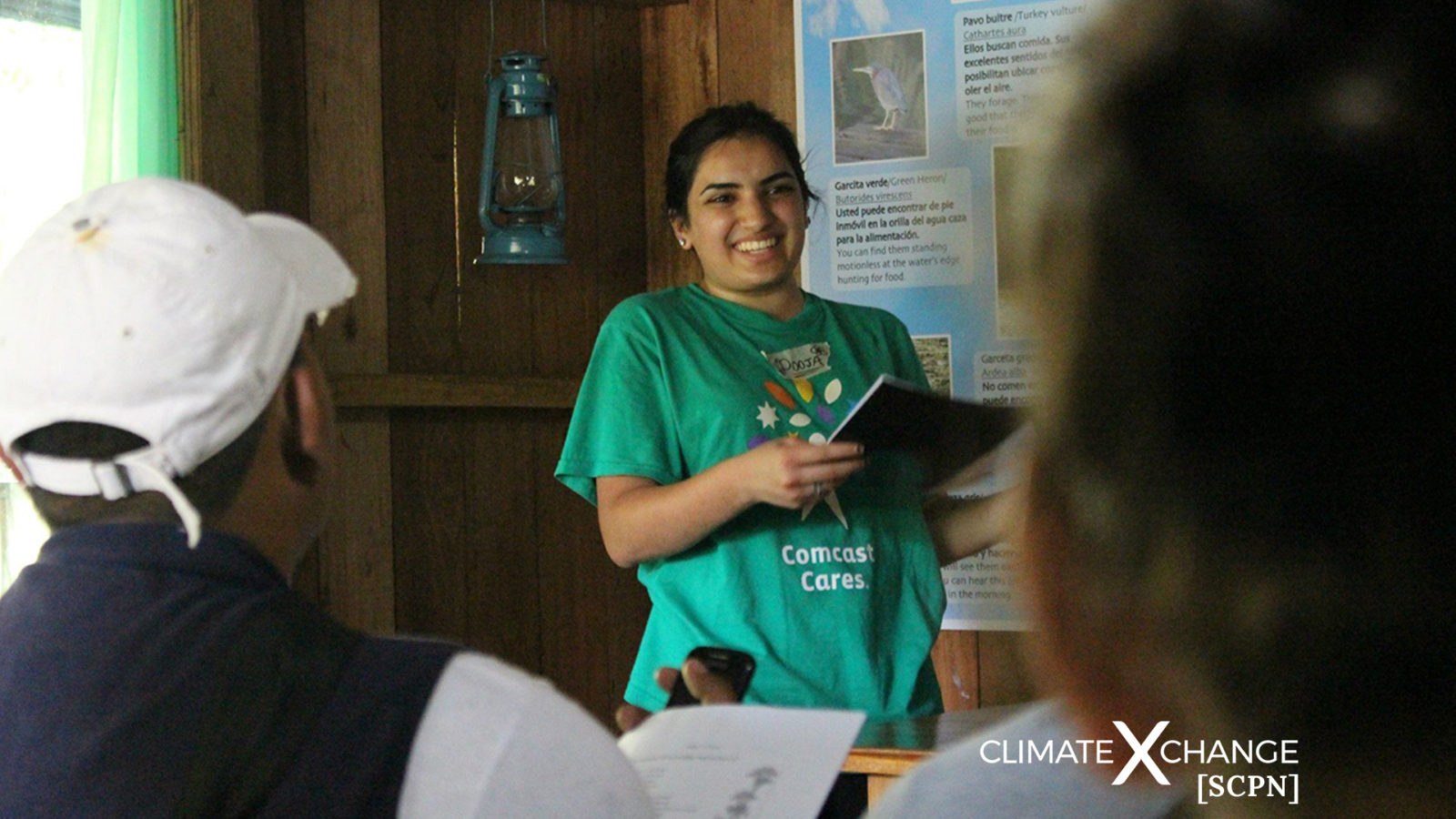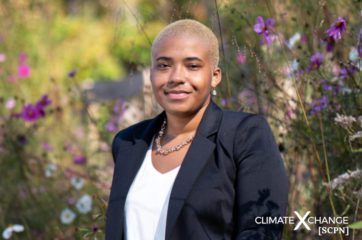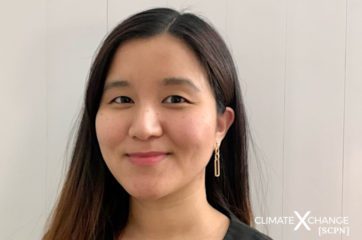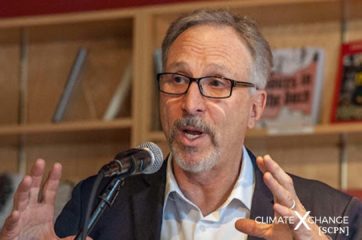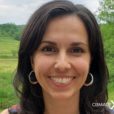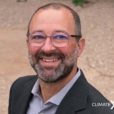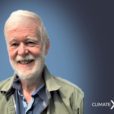All across the country, members of our State Climate Policy Network (SCPN) are fighting to make an impact on climate change in their communities. We have individuals in our Network from all 50 states, each experiencing climate change differently in their local areas and finding unique solutions to build resiliency efforts.
Pooja Tilvawala is an ambitious youth activist working for a more inclusive and effective climate movement, starting with the education, empowerment, and collaboration of young people. She is the Founder and Director of Youth Climate Collaborative (YCC), where she assists youth in getting involved and staying involved in climate and sustainable development work. She’s also a representative for the United States for the UN Climate Change Conference of Youth 16, as well as a member of YOUNGO, the official UN Youth Constituency.
This interview has been lightly edited for clarity and brevity.
Kristen Soares
So first, I know you do a lot — can you talk about any and all positions you currently hold?
Pooja Tilvawala
My name is Pooja Tilvawala, and I’m currently the Founder and Director of Youth Climate Collaborative (YCC). And with our funder, Kennebunkport Climate Initiative (KCI), I work as the Youth Strategic Network Specialist. In this role, I help connect them with youth and entities that would be good for them to talk with. Outside of work, I am a representative for the United States for COY16, which is the Conference of Youth 16. We are collecting policy recommendations from youth around the U.S. to summarize in a two-page report, highlighting the top three recommendations to then give to GAU, the Global Affairs Unit, which is mobilizing youth around the world. Ultimately, they will put together a giant report for the leaders at COP26 to read and learn what youth want. In addition, I am a U.S. Climate Ambassador with the World Bank’s Youth 2 Youth Global Youth Climate Network, and we are tasked with leading 3 climate projects throughout the year. One thing wrapping up is my time as a Global Goals Ambassador for SDG 14, life under water, with the United Nations Association of USA (UNAUSA). I’m also a member of YOUNGO, which is the official U.N. Youth Constituency.
Kristen Soares
That’s super cool. You do so much amazing stuff that really touches a lot of different spheres. So, jumping into more substantive questions. I think the climate sphere is not really a profession that people go into without some sort of fierce passion. Could you talk a little bit about your passions and how those arose, and what got you into this work?
Pooja Tilvawala
Growing up, I always liked being outside. One of my favorite memories of childhood was the rare times that we would go kayaking in our local park; I always looked forward to that. I grew up in a suburb of Philadelphia, where the YWCA — Young Women’s Christian Association — was very active in our community. They would have free community programming, like Homework Club for right after school; Saturday camp, which is just two hours of meeting other kids in the neighborhood and doing fun activities; summer camp, stuff like that. It really taught me about community work and being really engaged and involved in your community, with whatever needs they have. They focused more on the need for housing, and food, and learning about computers, and after-school programming. For a while, I was really in the education sector-ish, like volunteering for Jumpstart, an AmeriCorps program. Then I started transitioning to education plus climate change. So, getting kids to go outdoors and trying to encourage more outdoor time in schools. This was through my work at Urban Adventure Squad, cool name. We had a squad of kids that, on their days off from school, we would take them outdoors in D.C. to learn about their neighborhoods and do cool science activities together. That was the transition, and that was throughout college from 2015 to, even after college, up until 2019, I was working with them on the side. I also had a short-term Farmers Market gig.
In September 2018, I went to the Global Climate Action Summit through UNAUSA, and that’s when I was like, wow, this is the place for me. I was just in awe, and amazed that there were marches going on in the street, about climate change, and fossil fuels specifically. At the event itself, there were so many topics that you could explore related to climate change, like finance, or immigration, or disaster relief, just so many different topics. I was just amazed, and the number of people there from different countries was amazing to see. I really liked that environment, where my passion for getting to know about other cultures and ways of life could really blossom, meanwhile, intellectually, I could focus on climate change, but in an intersectional way, and how it intersects with not only different academic areas like finance, and immigration, and what we discussed, but also different identities, like gender, race, economic status, etc. I like how it intersects with social and academic areas; for my intellectual curiosity, it’s a great place to be, and it’s also not limiting in terms of career direction. There are so many different directions you can go. So that’s when I really was like, wow, I think this is it. It was just so broad and so cool.
Kristen Soares
That sounds super amazing. And that sounds like a really interesting path. So far I’ve had a pretty linear path. Since high school, I’ve been like, this is what I want to do. And now I’m here.
Pooja Tilvawala
Yeah, I didn’t know what I wanted to do.
Kristen Soares
A lot of people are like that. I think I’m in the minority of people who have ended up in the climate space.
Pooja Tilvawala
I actually applied to half my colleges as a neuroscience major, and the other half as international studies. Then I went the international studies route, which was also broad and gave me room to figure out what I like. Junior year is when I started finding myself moving towards climate change, because I completed an environmental economics course, and then a remote sensing course my senior year. I knew by that point that this was it. And the Global Climate Action Summit really was the turning point, my “Ah-ha” moment.
Kristen Soares
For sure, that’s super cool. At the SCPN we’re all about cross-collaboration and complimentary work, and I know that your work at YCC is related to KCI — could you talk about that, and how your work at YCC dovetails with the work of KCI and how those fit together?
Pooja Tilvawala
Yeah, so actually, in February 2020, over a year ago now, is when I started drafting a plan, outside of my other job. I just asked myself the broad question of, how can we make it easier for youth to get involved and stay involved in climate change and sustainable development work? And how do we foster collaboration among different entities on this work? Then, in September 2020, I was just on LinkedIn, researching environmental organizations that focus on youth. Actually, when I went on LinkedIn, there was this job recommendation for KCI that had a climate career competition for recent college graduates. And it said, submit your plan to educate, empower, and activate youth in the climate space. And I was like, I already have this plan. So I just added a little budget sheet and then submitted what I had been working on for months.
It was really validating to have won that and see that this plan has substance, you know, it’s not just fluff. People believe in it, and believe in me, and so KCI, I would say, really lifted my spirits. It’s nice when someone believes in you, right, and they invest in you literally, financially, and mentoring, and all that. So, they are our supporters, the YCC’s OG supporters. Now that YCC has grown these past seven months, and we have established programming and more, we are now partnering on some of that programming, like to grow our Eco-Action Map and spread awareness on our Climate Courage Workshops. Then we’ll help them grow their Learning Labs and their partnerships, as well. I’m really looking forward to seeing how our work continues to grow together in close partnership.
Kristen Soares
That’s super cool!
Pooja Tilvawala
Yeah, that was really encouraging. I was like, wow, they really liked the work so much that they’re funding and supporting it and me. They’re also very new, they just started in January 2020, but they’re growing fast, very fast. I’m also excited to see what we can accomplish together because they want to reach 10 million youth by 2025.
Kristen Soares
I feel like, though, the organizations that have sprung up around the beginning of quarantine time are a different beast. There’s so much growth that has happened in the past year, not just in the climate space, but just in general. So that’s super cool to hear.
There’s over 14,000 people in the SCPN and I chose you for this interview. So obviously, I think you have a unique, interesting perspective. But what do you think is the quality that makes you unique and successful in this line of work?
Pooja Tilvawala
I think I’m a great example of someone who is able to envision a better world than the one that we live in, and has taken that vision and turned it into something that is implementable to reach that vision. I looked at, essentially the world, and being sad about it, and seeing that doom and gloom scenario and feeling like, what can I do? Will it even matter? Feeling small, right, many of us have felt small, at some point, it’s one step forward, ten steps back. Especially, even if you’re moving forward, a lot of other things are moving back, especially during the whole Trump era. And, you know, feeling kind of hopeless and thinking about, what can I do? But just reminding yourself that it does matter, even if it feels so small, and it’s just a drop in the bucket, what you do really does matter. And so reminding myself of that, and then thinking about how we can make this world a better place for everyone.
Then, also, being someone who didn’t have mentorship in where to start in the climate space. I’ve just kind of figured out my own path, right? If something doesn’t exist, try and make it exist, and just keep reaching out to people to figure out what opportunities there are, and increase your own access to opportunities in that way. It’s just a lot of trial and error. I made that plan based on the vision that I had, you know, I envision a world where the potential that each youth has is maximized, the opportunity to reach your potential is maximized. That only happens when you have a lot of easy access to opportunities, and you know where to go. So, that’s really my role is to be a facilitator and show youth that these opportunities exist, and how to get to them, and make their dreams come true as well.
Kristen Soares
That’s definitely cool. I love hearing people talk about themselves, because I think it’s a really, really great way to get at the core of who they are and why they’re doing this.
Pooja Tilvawala
I want youth to see my story and know for themselves that, you know, I had no idea when I wrote that plan that there would be this random competition that I would just happen to see, and win, and be working full-time on implementing my plan every day. Literally a dream come true. My biggest piece of advice would be to never assume that something isn’t possible. Never assume what somebody is going to say about your ideas or your goals. Just believe in yourself, and keep going at it, and seek mentorship, and seek friends. Even people you don’t know, on LinkedIn and stuff, to review your plans or your ideas, and just keep tweaking them, and that way you’ll be prepared for any opportunities that come your way. Then you can submit your plan, or your ideas, or find other youth to bring them to fruition with you. I would say just never assume, and dream of a better world and make it happen. Learn how to make it happen.
Kristen Soares
That is definitely super important. I think that climate despair is such an insidious and widespread issue. It’s really hard for a lot of people to even think of having a view of something that’s beyond this, because we’re all just surviving.
Pooja Tilvawala
We run Climate Courage workshops at YCC, to help youth learn to lean into their feelings caused by climate change, create a self care plan, and learn how to build their emotional resilience. Actually, one participant, she made a great point, I love that she said this. Essentially she was saying that we were born at this time for a reason. How lucky are we that we were born at this crucial time and have the opportunity to help save our planet? You know, there’s a reason we’re here right now. Just remembering that, seeing it as an opportunity to help in your lifetime, instead of an obligation or worry, like, “Oh, of course, this had to happen. Now, what are we going to do? We’re f’ed.” All that kind of stuff.
Kristen Soares
Teaching kids to lean into that is super important, because there’s this myth of objective science being the only good or true thing that needs to be out there. And then, the whole climate movement is like, no, our feelings are also important. So those workshops are really cool.
Moving on, what is one issue within the climate movement, or this work in general, that you think doesn’t get enough attention, or that people aren’t working enough on?
Pooja Tilvawala
I think coordination and collaboration needs more attention. I feel like in the U.S., a lot of organizations and individuals are working in silos, by themselves, doing awesome work. I feel like, if we all worked together, more often, and more efficiently, and intentionally sought out other perspectives and teammates, then we could just be so much more impactful and have such a louder voice. That’s the end goal of KCI and YCC, to have a cohesive youth voice or ally voice. I think there needs to be more structures in place to allow for meaningful and easy coordination.
Kristen Soares
Someone once said to me that climate change is the biggest collective action problem that we’ve faced. And humans, in general, especially in the Western world and in the U.S., we are just awful at collective action problems. We just don’t want to do it, just don’t have society set up geared toward collective action problems.
Pooja Tilvawala
Definitely, and each state even politically, states have their own policies in place compared to federal. You really have to have an approach that is, you know, local jurisdiction to state to federal. It takes time, and then there’s just a lot of bureaucracy involved too often.
Fundraising is another thing, but I’m seeing a lot of change. In the philanthropic space, having looser funding guidelines, so organizations aren’t wasting lots and lots of time trying to put together the reports and stuff. Allowing for grants to be spent on staff hours as well, instead of just work and programming.
Kristen Soares
So, then, my last question. The climate movement is always in a state of flux, but especially this past year, I think it’s been going through a big reckoning that a lot of us have been saying it needs to go through for a long time. What is something that you’re really excited about in terms of where this movement is headed? Or could be headed?
Pooja Tilvawala
So obviously, in the U.S., in the past year and a half, we’ve seen a lot of growth, kind of an awakening on racial disparity, and narratives of minority groups, and underrepresented groups. Not only in the workspace, but in the climate change field. I like that there’s a lot more discussion now on who is causing harm to our environment, and who is being impacted by it. And that those being impacted, we’re seeing at least more narratives from them, and more sharing of their own stories than before. I’m excited to see that trend continue, where those most impacted by climate change are put at the forefront of this movement. That organizations seek their advice and work with them, give them space in decision making spaces, to contribute to the strategy of orgs and how to best serve their communities.
So, that’s exciting, and then the rise of youth! Youth are amazing, really just kicking a**. My hope, and, you know, concern mixed with hope, is that adults see that age is not a measure of ability. It is difficult for people to see, especially because there’s the whole question of, who deserves a specific position or something, if somebody has 20 years of experience versus a youth who is capable. So, I hope moving forward, people see the ability of youth, and they give youth the opportunities they are capable of handling so that they can reach their full potential sooner instead of having to wait years and years to be able to give back the way they can.
It is complicated, but there has to be an option.
Kristen Soares
But even now, the freshmen that came in this year to UCLA, are…I would not have gotten into UCLA, if I was competing against them. They are doing so much, and it’s just a four year difference.
Pooja Tilvawala
But social media grows so quickly, right? Even though it’s been four years, it’s like 20 years in that world. That’s largely caused shifts in the latter half of your generation, right?
Kristen Soares
Yeah, it’s definitely interesting to see where this goes. Well, thanks so much for chatting with me today!
Pooja Tilvawala
Of course, thanks for having me!
Check out youthcc.org, and sign up for their newsletter here! Create a free account on their website and add listings for events, jobs, and other opportunities here. Visit this page for our other social media accounts.
Email us at pooja@youthcc.org if you have any questions, or comments, or would like to connect!

